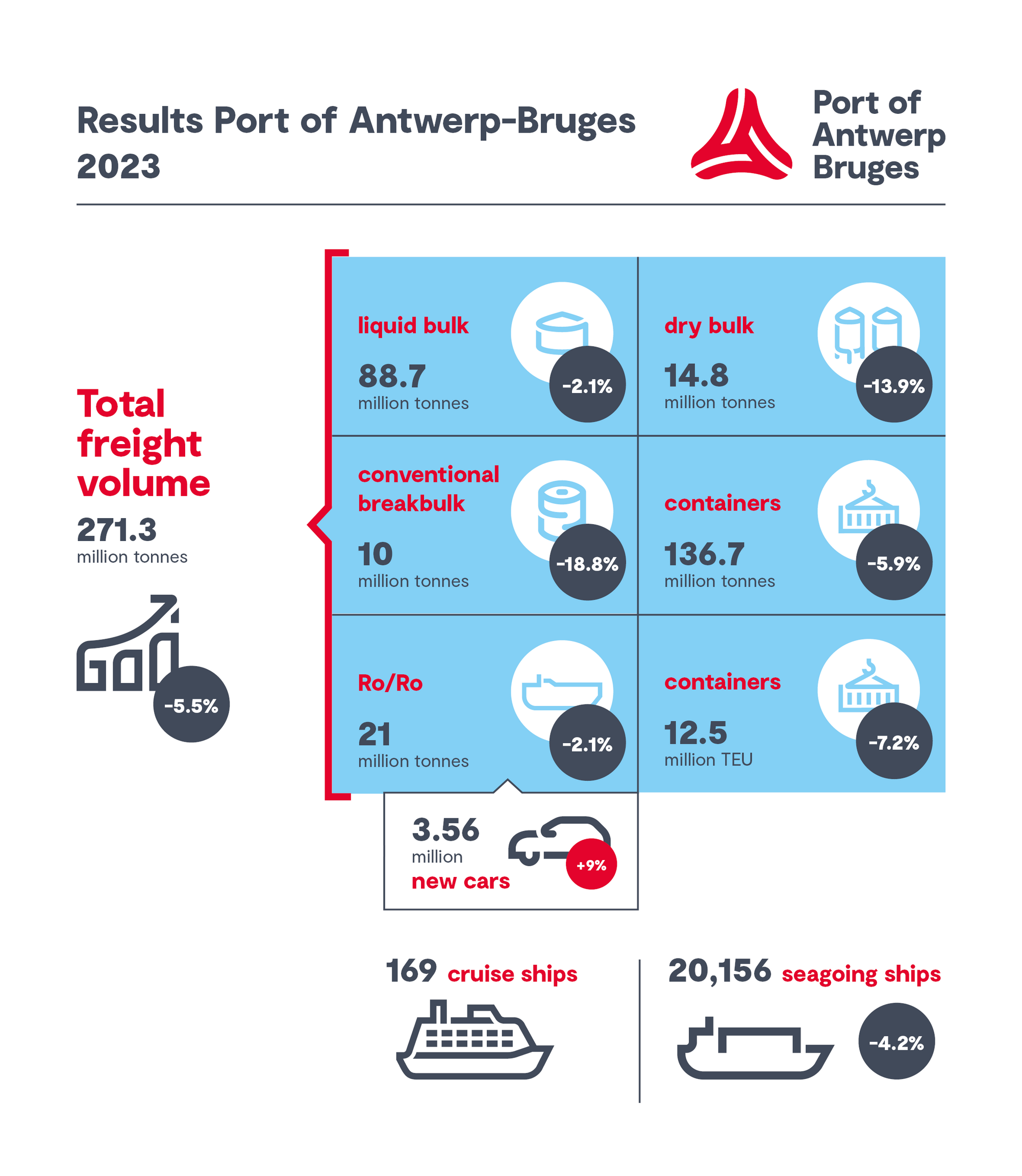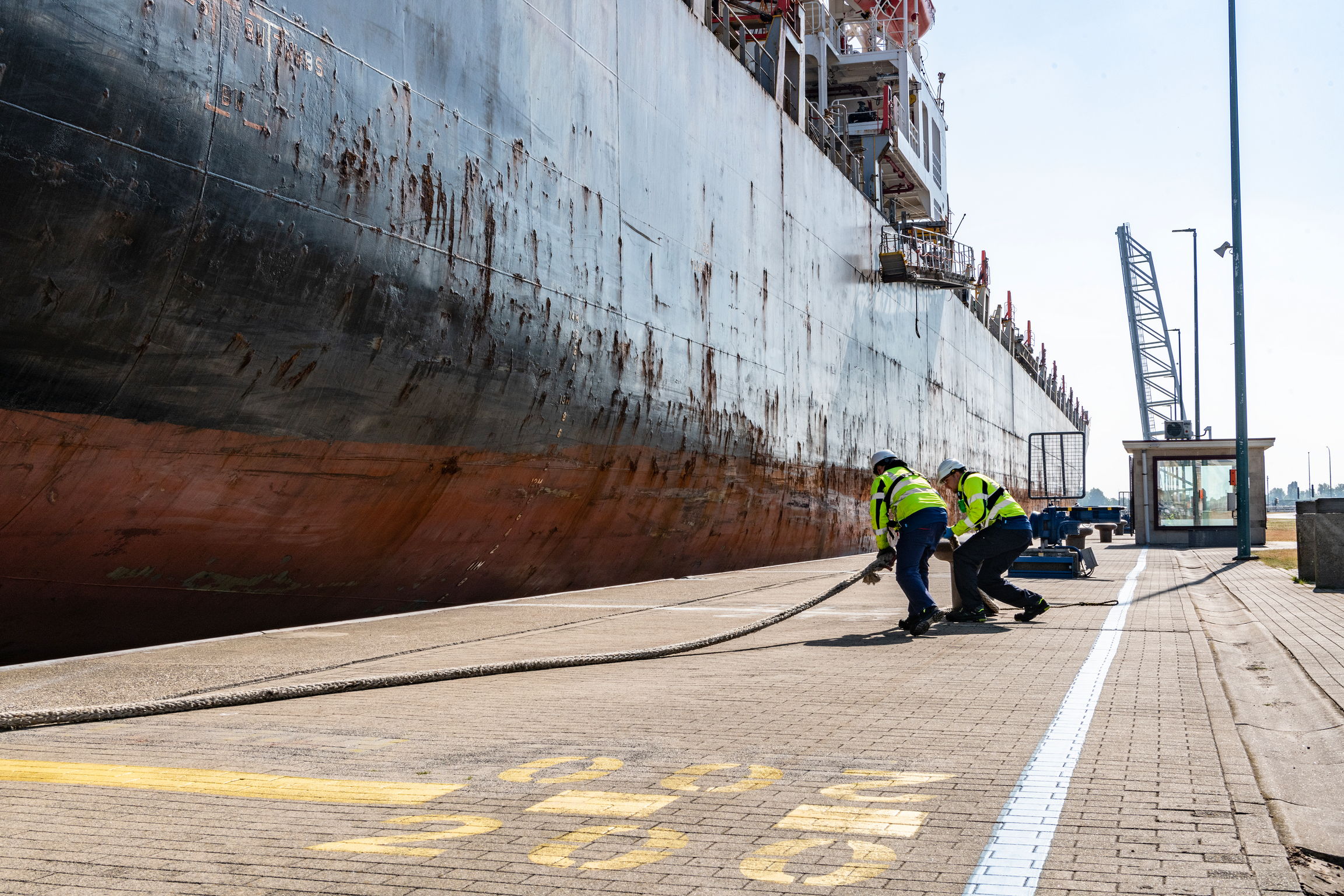Geopolitical tensions and slowing economic growth are reflected in the annual figures of Port of Antwerp-Bruges
2023 was another challenging year for Port of Antwerp-Bruges. Geopolitical tensions and slowing global economic growth are driving down industrial production and trade flows. As a result, total throughput, which was 271 million tonnes of cargo in 2023, is down 5.5% from the previous year. Despite this difficult context, thanks to the added value of the merger, the market share of the container segment increased compared to the other ports in the Hamburg - Le Havre range. To ensure its strategic role as a world port in the future, sustainable growth remains a priority and a major investment programme is foreseen for the next 10 years.
Weak global economic growth and lower demand for commodities is weighing on global demand for container transport. For Port of Antwerp-Bruges, this corresponds to a decrease in container throughput of 5,9% in tonnes and 7.2% in TEUs, compared to 2022. In contrast, Port of Antwerp-Bruges' market share in the Hamburg - Le Havre range rose 0.6% points to 30.2% in 2023.
Liquid bulk throughput is down 2.1% during 2023. Fuel throughput is up thanks to strong growth in diesel and paraffin while petrol and fuel oil are down. Naphtha throughput is down due to lower industry demand while LPG throughput is static. The chemical sector is under pressure across Europe due to high energy, raw material and labour costs and low demand. This translates into a decrease in chemical throughput of 8.1%. Biofuel throughput is down and LNG also remains below last year's levels when as much as possible was supplied in the midst of an energy crisis.

The throughput volumes of conventional break bulk have normalised, after a strong post-Covid-19 recovery between spring 2021 and September 2022, to pre-Covid-19 levels. Compared to 2022, total throughput is down 18.8%. Due to a decline in European steel production and lower demand, the handling of steel, the main product group within conventional general cargo, fell by 16.9% with exports (-15.5%) holding up better than imports (-17.9%).
Total roll-on/roll-off traffic is holding up relatively well with a slight decrease of 2.1%. Transport equipment troughput (in units) is up thanks to an increase in the throughput of new cars. In 2023, 3.56 million new cars were handled, an annualised growth of 9.0%. Throughput of unaccompanied cargo (excluding containers) carried on RoRo vessels is also down slightly (-1.5%). More than half of these flows are related to the UK and are down (-4.9%), while traffic related to Ireland is up sharply (+17.9%), while Scandinavia traffic is holding up.
The dry bulk segment is down 13.9% on last year. Demand for coal, which was high in 2022 due to the energy crisis, has since fallen sharply. Fertilisers, which were already down last year partly due to sanctions against Russia and increased fertiliser prices, are also down further this year.
Zeebrugge welcomed 169 cruise ships and 953.048 passenger movements in 2023, making 2023 a record year. A spread of cruises both throughout the year and during the week, ensured a staggered inflow.
In 2023 20.156 seagoing vessels called at Port of Antwerp-Bruges, a drop of 4.2%. The total gross tonnage of these vessels grew by 2.6% to 657 million GT.
Investing in the future
As a world port and gateway to and from Europe, Port of Antwerp-Bruges is a crucial link in the international logistics chain. Sustainable growth is therefore key. Not only by attracting investors, but also by investing itself. Over the next ten years, the port therefore envisages an investment programme worth €2.9 billion, including in new infrastructure such as a quay wall for the Europa Terminal, a new coordination centre and residual land on the Left Bank.
In terms of both energy supply and energy transition, the port intends to continue to play its pioneering role in the future. For example, Port of Antwerp-Bruges is actively promoting a circular economy with the implementation of the Warmtenet Antwerpen Noord project. The first delivery of heat will soon take place, and further development of the NextGen District is planned for this year.
To meet the significant demand for renewable energy, the port is not only focusing on local solar and wind energy, but is also strongly committed to importing green energy. Hydrogen acts as a key element, serving as an energy carrier, raw material for industry and fuel for shipping. This year the port will see the first bunkering of hydrogen and hydrogen carriers, such as methanol.
As part of the greening of the Port of Antwerp-Bruges fleet, two pioneering vessels will be introduced: the Methatug, the world's first methanol-powered tug, and an electric RSD, a first for Europe. In addition, shore power is being further developed, with work starting on the shore power installation for the cruise terminal in Zeebrugge later this year. Finally, the port is working with industry on CO2 reduction through CO2 capture. Work on the CCS terminal is expected to start this year, after the investment decision is taken soon.
Jacques Vandermeiren, CEO Port of Antwerp-Bruges: "We had seen it coming for some time that: 2023 would not be a great year. After all, as a port, we are at the centre of economic and geopolitical challenges. But, with a powerful strategy, the merger and an efficiency exercise, we have managed to organise ourselves in good time and are even gaining market share in the Hamburg-Le Havre range. Especially in more turbulent waters, it is essential that we continue to sail in the right direction, with our strategic plan as our compass. That is what we will continue to do so in 2024. To remain attractive to investors and to continue our strategic pioneering role. Legal certainty is crucial in this regard. We therefore expect the government to promptly clarify a workable licensing framework and correct conditions to continue to operate as a business and attract investment as a top platform."
Annick De Ridder, Vice-Mayor of the City of Antwerp and President of the Board of Directors of Port of Antwerp-Bruges: "Our port is the economic engine of Flanders. This engine has held up well over the past year despite major economic and geopolitical challenges, thanks to all the employees and companies giving their best. I would like to take this opportunity to thank them once again, especially as we still managed to gain market share in the Hamburg-Le Havre range, despite a 5.5% decline in total cargo throughput! Our port generates wealth. In order to continue to grow, it is vital that we remain attractive enough to attract necessary investments. Key projects such as ECA (Extra Container Capacity Antwerp) and NSZ (New Lock Zeebrugge) therefore remain top priorities to secure our position as a world port in the future. The year 2024 is already off to a good start for our port with the permit for Ineos . Excellent news for our jobs and our Flemish prosperity."
Dirk De fauw, Mayor of the City of Bruges and Vice-President of Port of Antwerp-Bruges: “We have now been one single port for over a year and a half and the added value is clearly showing, especially given the current difficult context. It allows us to spread container volumes across both platforms and makes us a stronger brand as a port internationally. As a fusion port, together with the industrial sector, we are also taking important and essential steps in the energy transition, towards a climate-neutral port by 2050. However, in addition to the economy and climate, our focus is on people and the environment. We are a port of, and for, people, and are aware of the impact of our activities on the environment and local residents. We therefore remain committed to the quality of our environment."
